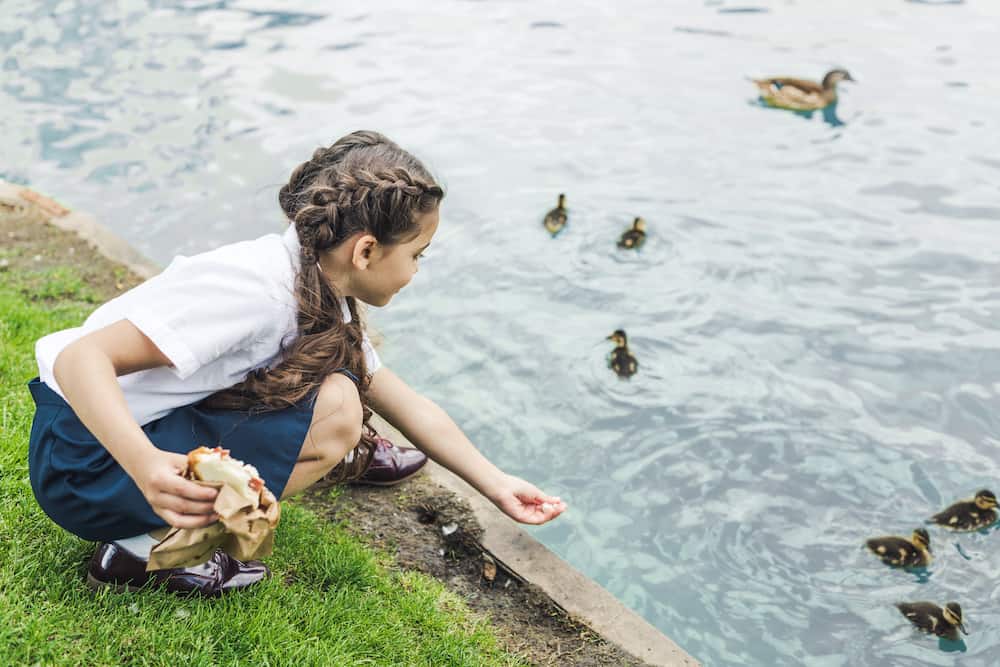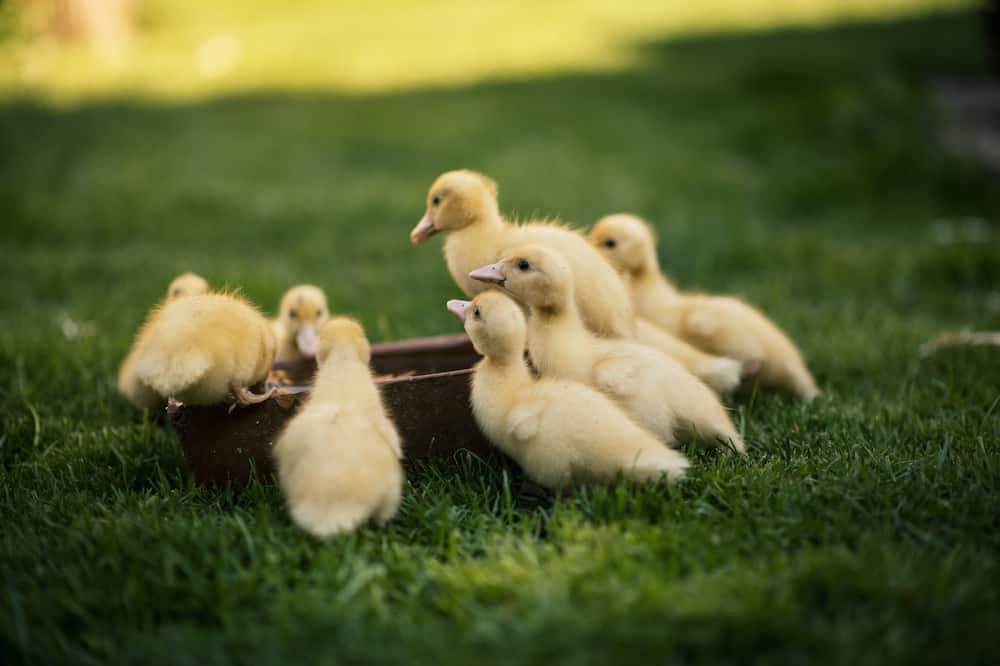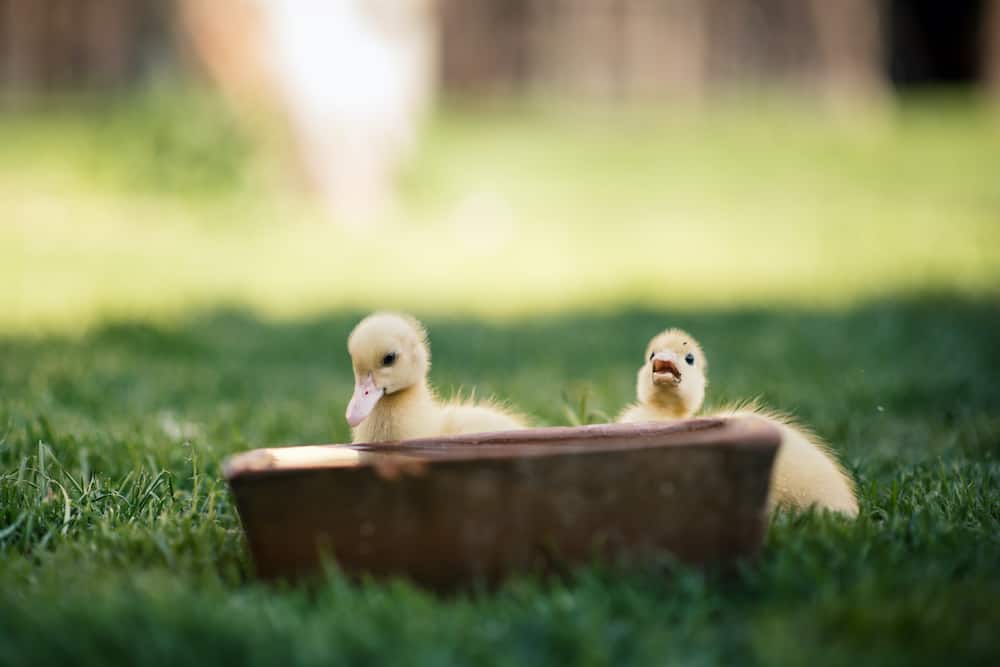You need to know what to feed ducklings if you’re considering raising or breeding ducks. Their dietary needs change depending on their age.
Knowing what to feed ducklings is also important if you want to raise strong, healthy animals.
As a first time duckling owner, you’ll also need answers to questions like “How often should ducklings be fed?” and “How to feed a baby duck?”
We’ll this information and more to ensure that your ducklings meet all their nutritional needs and help you become a more responsible duck owner or breeder.
What to Feed Baby Ducks
The good news is, no matter what your reason is for raising ducks, the diet of a duckling is pretty much the same across the board.
It doesn’t matter which duck breeds you choose or whether you’re raising ducks as pets or for eggs or meat, they will all start life with the same basic nutritional needs.
Let’s take a look at duck feeding in more detail, before explaining how their needs change as they get older.
Feeding Ducklings: Protein / Amino Acids
For the first three weeks of a duckling’s life, they should be feed duck starter feed only.
Among the most essential nutritional requirements for ducklings and ducks are protein and energy sources. These will greatly impact the productive and reproductive performance for eggs and meat.
In the first three weeks of life, ducklings grow quickly. They need a starter diet with feed that consists of 18% – 20% protein. Crumbles are best. If you get pellets, be sure the pellets are small enough for the baby ducks to ingest. They should be no more than 1/8″ in size.
Leave the food out at all times for them to access as needed. In addition, provide insoluble grit.
You should place feed on rough paper or cup flats for the first several days. Don’t use chick box tops or other smooth-surfaced lids or paper as feeders. Slick-surfaced materials can cause leg damage.
As ducks grow, they will require less protein. So while starter feed should consist of 20% protein, their grower feed should contain 17 – 19% protein. A duck breeder feed diet should be 16% protein.
For the first 21 days, feed ducklings starter feed. After that, you can reduce the protein level to 15% and start feeding ducklings additional foods.
According to Agriculture and Life Science, North Carolina Cooperative Extension, you should not feed ducklings medicated feeds meant for other birds.
How to Feed a Baby Duck With Fruits
1. Strawberries
Just as much as we love strawberries, your ducks will, as well. As a delicious and sweet addition to their food, strawberries have tons of essential vitamins and minerals that they are bound to love.
Strawberries have enriching calories, but they also contain vitamin C, manganese, and carbs that are vital to ducks.
When it comes time to feed your ducks strawberries, it’s best if you’re able to mash them or cut them into tiny bits. This point is particularly valid for feeding ducklings since you won’t want to give them a choking hazard.
2. Bananas
It’s hard to think of animals that don’t like bananas, especially since they’re sweet and have a delectable texture.
You can guarantee that your ducks will love bananas. Like how you would prepare your strawberries, it’s great to cut the banana up into small pieces.
Alternatively, you can opt to mash it so that it’s easy for them to eat. You could also consider making a fruit puree with all of their favorite healthy ingredients.
3. Peaches
Did you know that peaches are one of the best sources of niacin for your baby ducks?
As a fruit that contains plenty of nutritional materials, it can be a phenomenal treat. With that said, they will require a little bit of extra preparation before they are ready to be given to your ducklings.
You will want to make sure that you remove the pit from any pitted fruits, particularly peaches. This step is quite essential since fruit pits and seeds, such as those from cherries and apples, are toxic to ducks.
It’s best if you’re able to cut around the pit and then provide your animals with small chunks of peaches.
Baby Duck Feeding: Vegetables
1. Leafy Greens and Root Crops
One of the most important things to remember with vegetables and leafy greens is that you need to prepare them adequately. You don’t want to have excessively long pieces or strands of leafy greens that could get caught in their digestive tract.
Interestingly enough, ducks do not chew their food; therefore, all of their vegetables will need to be mashed or cut up small.
There are several types of leafy greens and vegetables that your ducks are sure to love, including:
- Swiss chard
- Salad Greens
- Lettuces
- Turnip Greens
- Cabbage
- Broccoli
- Beets
- Kale
- Cut grass (without chemicals)
- Radish
Note, you shouldn’t give ducklings or ducks spinach.
Later stage ducklings will enjoy greens you put in clean water. Tear them up and put them in the water. They’ll float, and the ducks will love getting them.
If you want an idea for an inexpensive way to keep your ducks fed, we recommend researching duck gardens. You can efficiently allocate a piece of your property to grow plants that your animals specifically love.
With a duck-only garden, you can grow the vast majority of food that they will enjoy mainly for free.
2. Cucumber
Cucumber is one of the top tier items that your ducks are bound to love. There are a ton of vital nutrients in cucumber, including vitamin C, vitamin K, magnesium, manganese, vitamin A, fiber, and potassium.
But what it’s most known for is its high concentration of water, which can be beneficial to your ducks’ digestive systems.
When you’re preparing cucumber, you must make sure that it is peeled and raw. As ducks do not chew their food, you won’t want them having to gnaw through cucumber skin without eating it properly.
They’ll especially love it if you cut it up into small cubes that are easy for them to eat.

3. Peas
Even though you might have hated peas as a kid, your baby ducks love them. You’ll want to make sure that you opt for fresh peas from the store or frozen peas. You can give ducks frozen peas.
Peas are commonly known to be an excellent treat for ducks, especially if you’re training. They’re small, easily digestible, and a strong motivator for having your ducks listen.
Also, since they’re so simple to manage, you can throw them to your ducks throughout the day. They will also enjoy corn kernels.
4. Zucchini
Similar to cucumber, zucchini is mostly known for its high concentration of water content. However, it also has plenty of other benefits such as carbs, fiber, vitamin A, and manganese.
You’ll want to prepare it exactly as you would with a cucumber by peeling the skin and cutting the vegetable into small pieces.
What we love about this vegetable is that it opens the door for a unique wintertime recipe.
Instead of feeding it to your ducklings raw, you can make vegetable soups by putting it in a warm bowl of water. During the winter, they’ll surely love their warmed greens.
5. Tomatoes
You can easily feed your ducks any variety of tomatoes, but you must ensure they do not eat any vines or leaves. The leaves and vines on your tomato plants are toxic to birds, so you’ll want to prepare the flesh only.
You can easily cut large tomatoes into smaller pieces, and even if you have cherry tomatoes, consider cutting them in half.
As a wonderful trick, cherry tomatoes are a sure-fire way to hide your duck’s medication, especially in pill form.
Consider raising Indian runner ducks which are reliable egg layers and wonderful for controlling insects when able to free-range.
What to Feed Ducklings: Alternatives
1. Waterfowl Starter Feed
Ducklings should not have chicken starter feed. The ideal food for ducklings is a specially formulated waterfowl starter feed with everything they need for their proper growth and development.
You will find waterfowl starter feed at feed stores and some hardware stores.
2. Eggs
Eggs are one of the best ingredients on this list for protein, apart from bugs. The most important thing to remember is to cook the egg first. Scramble them or boil them. You don’t want the ducks to get a taste for raw egg and eat their own.
Even though it might seem like a strange option, feeding your ducks boiled and scrambled eggs can significantly improve their diet.
There is an ample number of farmers and breeders that say eggs are the best answer to what to feed baby ducks.
Not only are they delicious, but they are also nutritious for your animals.
If you have far too many eggs left over at the end of the season, you can put them to good use. If you’re feeding an adult duck, you can keep the eggshells on the boiled eggs since they help provide extra calcium.
For ducklings, though, remove the eggshells since they’re far too tough for younger ducks to eat.
If they were to consume eggshells, there’s a likelihood they can experience digestive issues. Also, an excessive amount of calcium can negatively impact the growth of their organs.
3. Duckling Treats
Later stage ducklings can also be fed treats from time to time, but they should still be getting most of their nutritional needs met through their starter feed.
If you’re giving your ducklings treats, they must have constant access to sand or dirt (grit) to help them digest their food better. Like chickens, ducks have gizzards that grind up their food for them.
With that in mind, below is a list of treat ideas your ducks will love:
Treats to Be Limited
These treats should make up no more than 10% of their diet. Later stage ducklings can eat:
- Dairy: Yogurt, cottage cheese
- Fruit: Stick with softer fruit and mash them up to make it easier for the ducks to eat. Bananas and peaches will be greatly appreciated, as will apple sauce, but make sure it’s an unsweetened variety
- Insects: Ducks will eat most insects, like snails and slugs, that you can find in your garden.
- Earthworms, mealworms: These are a popular choice. You can buy them from bait shops or even start your worm farm.
Unlimited Treats
When it comes to greens, older ducklings can eat as much as they want, and they will love all sorts of leafy greens. A really great idea is to finely chop some greens and mix them in with their water.
It keeps the greens fresher for longer, and your ducks will enjoy fishing them out. What’s more convenient is that you can feed them greens that you can find around your garden.
That includes grass cuttings, weeds, and dandelion and clover flowers and leaves.
Keep in mind, though, that you can only feed your ducklings greens from your garden if you haven’t treated it with any chemicals.
They’ll also enjoy almost any fresh herb, so you can try oregano, parsley, dill, marjoram, basil, mint, sage, and more.
You can also feed them other leafy greens such as Swiss chard, kale, and lettuce, but avoid giving them too much iceberg lettuce since it can lead to diarrhea.
You must also avoid feeding them spinach because it can disrupt calcium absorption.

What Not to Feed Your Ducklings
In addition to spinach, other foods to not feed ducklings include:
Adult Layer Feed
Don’t ever feed adult layer feed to your baby ducks, not even in emergencies. It has an extremely high calcium content for layers to produce healthy eggs.
This calcium level is toxic to ducklings and other baby waterfowl, causing problems with their bones, liver, and kidneys. It can even lead to death.
Shells
For the same reason, you should also avoid giving ducklings egg shells and oyster shells. Shells can be an excellent treat for your ducks, but only once they’ve reached adulthood at around 20 to 21 weeks.
Thus, once they’ve reached 20 weeks, you can buy crushed oyster shells, crush up old seashells, or crush up their own eggs’ shells to feed them with.
Others foods ducklings shouldn’t eat
Some of the food you should avoid giving ducks at any stage in their life include:
- Avocados
- Citrus fruits – this includes oranges, grapefruits, lemon, lime, tangerine, mandarin, etc.
- Raw and dried beans
- Chocolate
- White potatoes
- Bread
- Nuts
- Onions, leeks
- Popcorn
- Junk food, processed food
Some of these foods are toxic to ducklings and ducks. You want to remember to feed ducklings nutritional foods as well.
How to Feed Baby Ducks
Using a proper feeder will ensure that the food stays as clean as possible and help you achieve minimal food wastage.
Feeders reduce spillages and have a design that prevents the ducks and ducklings from stepping or standing on their food.
Like chickens, if your ducks or ducklings can stand in it, they’ll poop in it.
How Often Should Ducklings Be Fed?
Knowing how to feed ducklings is important, but for them to stay healthy, you must also know how often should ducklings be fed.
Food
Ducklings digest food quickly, so they need to eat often, so the best way to feed them is by free choice and always having food available.
You can get away with feeding older ducks twice a day, but you should aim for a minimum of three times a day for your ducklings.
You don’t need to worry about ducks overeating since there is no such thing.
Water
Ducks drink a surprisingly large amount of water, far more than chickens. Therefore, your ducklings will need a constant source of fresh water.
You should check it several times a day to make sure it hasn’t run dry and refill even if it’s not yet empty.
When the ducklings are very young, the water source should also be very shallow since they are at risk of drowning. So, until the ducklings have most of their feathers, the water should be set up in a manner that they can’t climb into it.
What to Feed Ducklings
To begin baby duck feeding, start with waterfowl starter crumbles. If you know you have baby ducks on the way, it’s easy to stock up in advance.
The duckling starter feed you choose for the first three weeks will contain the proper ratio of protein, niacin, calcium, vitamin D, and more. This will support your ducklings in their first weeks of life. Be sure to purchase waterfowl starter feed and not chicken starter feed.
As they get a little older, after 21 days, what to feed ducklings changes slightly as they need less protein and amino acids. You can supplement the later stage duckling with fruits, vegetables, insects, earthworms, and more.
- Can ducks eat chicken feed – Duck Feeding 101
- How to build a duck house
- Duck eggs vs chicken eggs

